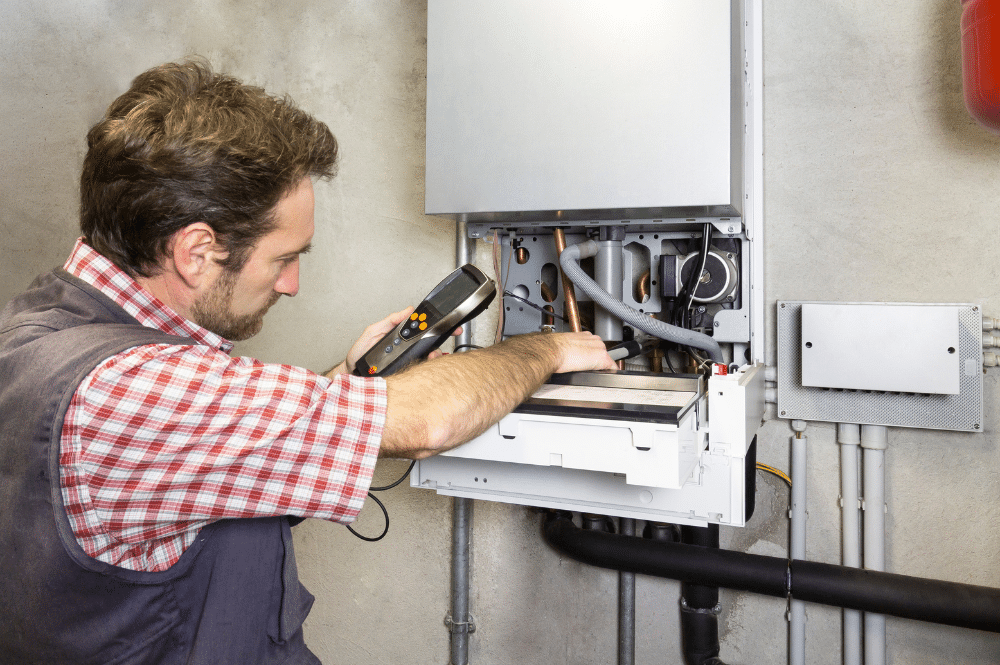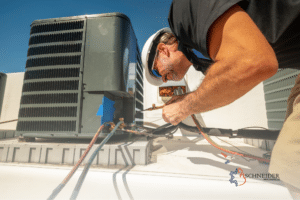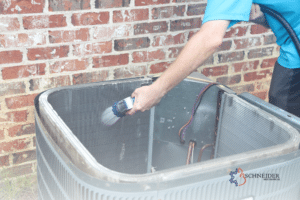The current Winter hard freeze aside, Austin temperatures tend to go from hot to semi-hot. In April, when most parts of the country see their temps get over 50 for the first time in months, we’re hitting the mid-80s.
By the time May rolls around, it’s not unusual for us to get into the 90s. At this point, your air conditioning system going out isn’t a matter of inconvenience, but a matter of survival. Hundreds of people die every year from heatstroke, and thousands more suffer from other related issues, from dehydration to skin issues.
Having your AC condenser unit and system checked yearly is an important part of home maintenance. It will help ensure that your system works and that your family stays cool in the Summer.
Read on to learn more about air conditioner condensers, some common issues that can occur, and how to determine if it’s best to get air conditioner service or repair.
What is an Air Conditioner’s Condenser?
The air conditioner condenser is the part of your unit that sits outside of your home (in a vast majority of cases). It connects to your indoor unit through tubes that carry refrigerant, which then transfers the heat. This unit has two purposes depending on whether you’re heating or cooling your home.
All air conditioners operate on the same principle. They remove heat and humidity from the inside of your home or business and return cooled air to your space. The heat and humidity then get released outside through the condenser.
How Your Air Conditioner and Heat Works
The air conditioning system uses refrigerant and three parts: a condenser coil, evaporator coils, and AC compressor.
These three parts take gaseous refrigerant form and convert it back into a liquid, then back again. The AC compressor increases the pressure and temperature of the gas and then pushes it to the condenser coil, where it goes to a liquid form. That refrigerant goes back inside to the evaporator coil, where it evaporates and cools the indoor coil.
Your fan then blows that air across the already cold evaporator coil. The refrigerant absorbs the hot air in your building, which means that you have cool air going into your home while the hot air goes back out. The condenser coils push this air out, and your thermostat keeps track of the temperature to start and stop the process as needed.
Heating works similarly in regard to circulation. The condenser fan circulates the air across the coil to facilitate the transfer of heated air, and then the AC compressor compresses the refrigerant and sends it to a coil as hot gas. That gas goes to the evaporator coil where it provides heat for your home.
Common Issues With Your Condenser Unit
If your condenser unit doesn’t work correctly, it can throw off your entire system. It’s important to have it checked at least once a year so that you don’t get caught in the cold or heat. Whether your air conditioner isn’t working or you think you need heating repairs, let’s look at some common issues that can affect your AC condenser unit.
Blocked Airflow
We mentioned earlier that the condenser pushes hot air out of your home and outside. To do this, it needs clearance around the unit so that the heat can distribute properly.
When you do yard work, you’ll need to pay special attention to your condenser unit. Check your outdoor unit and make sure that it’s clear of debris. You don’t want tall grass around your condenser, which can clog up your unit.
You should also make sure that there aren’t any trees with branches hanging over the condenser. Not only will this lead to twigs, leaves, and dirt getting into your system, but the branches could also fall and damage the condenser.
Check your condenser regularly. Go out and look once a week to make sure nothing is blocking your unit. If you have a storm, wait until it passes and go outside to look as well. You want to make sure that the wind doesn’t blow anything into the unit and cause damage.
If you notice any dents or debris inside your condenser unit, call a professional to come out and inspect it immediately.
Refrigerant Leaks
The refrigerant makes the entire system run, so if you have a leak, you’ll notice it pretty quickly.
Refrigerant can leak both inside of your condenser unit and in the lines that connect your inside and outside unit. When this happens, you’ll notice that your home doesn’t cool down as quickly as normal. Your air conditioner will have to work harder, leading to higher bills and less comfort.
Refrigerant leaks are not only bad for your power bill but bad for the environment as well. The refrigerant causes damage to your yard if it gets outside of the unit, and if you have any pets that come into contact with it, they could get sick or worse.
If your bill rises and your unit doesn’t work as effectively as before, call a professional immediately.
Bent Fins Around The Condenser
This can happen if something comes into contact with your unit, particularly after a storm. Wind can blow loose debris into the condenser and cause the fins you see around your unit to bend.
People may believe that this is a cosmetic problem, but it could block the air from circulating through your condenser. This can cause it to work harder or cause problems for the interior parts of the unit. Those parts are both sensitive and interconnected. If one part goes out, it can wreak havoc on every other part of the air conditioning system.
There are some cases in which damaged fins have no impact on your air conditioning system, but there are others where it could have a major impact. It’s important to note that even if you see nothing other than bent fins, there are issues that might go beyond what you can see. You should call a professional and have them inspected to make sure everything is okay.
Coils That Become Dirty
Your air conditioner condenser unit will attract the dirt inside of your home. It will also bring dirt from the outside as well into the condenser unit. All that dirt blows around inside of your system, and will eventually build up on your system’s coils.
Once that build-up occurs, it gets harder for your system to send the hot air from your home to the outside. This makes it so that the air coming out of your vents will feel warmer than usual.
This causes a few problems. First, your home or business won’t get as cool as you’d like. Because of this, your air conditioner will have to work harder, driving your utility bills higher. When your system works harder than it needs to, it also lowers the life of your air conditioner and can cause other parts to wear out quickly.
If you want to maximize the return on your investment, have your condenser coils and evaporator coils cleaned regularly.
Issues With Your Condenser Fan
There are a few things that can go wrong with your fan, and all of them can cause your air conditioning system to not work properly. When your fan experiences issues, your home will have issues getting and staying cool.
One of the most common issues is a bent fan blade. This could happen for several reasons, but one common one is physical damage. Bent fins can cause your blades to bend, as can debris that gets inside your condenser unit.
You could also have a blown capacitor, meaning that the fan isn’t getting enough juice. A blown capacitor could make your fan run slowly, sporadically, or not at all. Many people believe the capacitor boosts the voltage, but this isn’t true. Instead, it stores a differential charge. Every capacitor has a voltage rating, which is a ‘do not exceed’ rating, not the amount of voltage it produces.
A technician can test the capacitor while the unit runs. The good news is that the capacitor is easy to test and replace in your unit.
Motor issues can also cause your fan to not work properly. The motor controls the movement of the fan, so if it struggles, the fan isn’t able to cool the refrigerant that keeps your home cool.
Schneider Mechanical can resolve these issues quickly. If you notice any issues, it’s best to call us right away to prevent future problems.
How To Prevent Issues With Your AC Condenser Unit
Keeping your condenser unit running will extend the life of your air conditioning system, helping you get the maximum return on investment. A new AC condenser unit can cost you thousands of dollars, so taking some preemptive steps now is an important part of homeownership.
Let’s look at some ways that you can protect your investment and keep your home cool year-round.
Regular Inspections
We can’t overstate the importance of having a professional company inspect your air conditioning system on a regular basis. Anytime we see an air conditioning system fail, the homeowner has admitted that they didn’t have regular inspections. In those cases, we almost always find out that we could have prevented total failure with an inspection in the past six months.
Each part of an air conditioning system exists inside an interconnected ecosystem. When one part starts to go out, it affects everything else. What seems like a minor issue today could spiral out of control.
Inspections stop small repairs that could cost a few hundred dollars from turning into bills that run into the thousands. They also prevent the system from failing outright, which tends to happen in the hottest parts of the Summer. This is a dangerous situation to be in, as most air conditioner service calls happen during this period. Because of the high number of service requests, you could wait days before someone can make it to your home.
Get an inspection before the Summer starts so that any issues can get fixed before the heat settles in and businesses get backed up. Spending a little money now could save you a massive amount of money later.
Keep The Area Around Your Condenser Unit Clear
We went over this early, but it’s an important part of air conditioning system maintenance.
Keep tree branches clear of your unit. You don’t want to have any branches fall onto your outside system and cause any damage. This will also stop animals from dropping nesting materials and other types of waste into your system.
You should also cut the grass around your unit to prevent excess dirt from getting into your unit. Ensure you don’t have water pooling around your condenser and always check it after any storm.
If you use a landscaper, ensure they’re also taking care of bushes, grass, and tree limbs around your condenser. It doesn’t seem like much, but this will add years of life to your condenser coils and overall air conditioning system.
While you don’t want to have any branches directly over your unit, using trees for shading is a great idea.
The cooler you can keep the air around your condenser, the easier it is to dissipate heat. This makes your unit run more efficiently and keeps it going longer. The best way to do this is to place the unit in a shaded area, but most of the time, your unit is where it is and there’s not much you can do about it.
The next best option is to plant some trees to the west of your unit. This will shade your unit during the hottest part of the day, allowing for improved heat dissipation. The easier it is for your unit to disperse heat, the longer your entire system will last.
Be Careful With Yard Work, Though
While keeping the area around your outdoor unit clean is good, be careful when doing yard work.
When you use a gas-powered mower, it takes everything on the ground, chops it up, and sends it through the chute. The problem is that small rocks also come flying out of the chute, sometimes at speeds that can do severe damage to your outdoor unit. Shockingly, the rocks that come out of a lawnmower chute deliver more force than a .357 bullet fired from a gun.
Leaf blowers can also cause a bunch of dirt, leaves, and other things to get into your unit. When taking care of your yard, make sure you keep leaf blowers away from your condenser and point the chute from your lawnmower away from the exterior unit. All it takes is one errant rock to damage the coils or break the lines that transport refrigerant.
Keep An Eye Out For Animals
While dirt, branches, and leaves are obvious things that you want to keep out of your condenser, there are other threats to it as well, some of which you may not consider.
For example, a man’s best friend could become the enemy if your dog decides to treat your condenser like a toilet. Dog urine can damage your unit. If your dog roams free in your backyard, it will pay to put a small fence around your unit.
Pests are also a significant concern for condenser units. The moisture the AC units produce can attract pests, and some may use it for shelter when it gets extremely hot or cold outside.
These pests can cause problems due to their droppings, chewing wires, and urine. If you notice any signs, you’ll want to either call a pest removal company or use some pest repellants you can find in the store.
You can also place a cover over your condenser, but it’s best to call a professional before doing so, as this can affect the unit’s ability to dissipate heat. These covers will also not stop all pests from accessing your condenser.
You can also place gravel around your unit to help stop some pests, and a small fence will help. The most important thing to do is check your unit once a week for signs of pests and to take action immediately if you notice any signs. Taking preemptive steps now will save you a ton of money later.
Do I Need a Repair or Replacement?
This is one of the most common questions we get when it comes to AC condenser units. The only honest answer that we can give is that it depends on your situation.
Ultimately, air conditioner units have a limited life span. No system that requires the conversion and movement of gas and liquid will last forever. The steps you take now can help determine how long your condenser will last you. Following the steps above will help, but they won’t stop every problem from occurring.
Air Conditioning System Service For Your Condenser
Generally speaking, if your condenser is under ten years old, you should be able to service your unit. Most of the issues listed above can be serviced by a professional company. The good news is that with a regular inspection, these issues can get caught early, limiting the amount of money you’ll have to spend on repairs.
The bad news is that there will come a point where the repairs start to happen more frequently. When that happens, you’re going to have a tough decision on your hands.
When is it Time For An Air Conditioner Replacement?
The words “AC replacement” scare people because they think of the upfront price. Often, people will put off a full replacement until their system fails, but this isn’t a good idea. As mentioned above, the chances of them failing increase when temperatures either reach their lowest or highest because they have to work harder than usual.
You’ll have to wait longer for service because other people have called in for air conditioning or heating replacement during these times, and you may have to get a hotel until the problem gets fixed.
The good news is that there are certain signs that it’s time to replace your AC.
If your AC is over 15 years old, it’s probably time to replace it. Once they reach that age, repairs start to stack up to where it’s cheaper long term to get another unit.
If you do need a replacement, we offer financing options so that you can spread out the cost of getting a new system.
After 12 Years, It’s Time To Get Serious About Air Conditioner Replacement
There are a few reasons that it’s cheaper to replace your unit around year 12-15. First, repairs start to outpace the amount that you would pay for a new unit. Some people say that if you take the cost of your repair and multiply it by the age of the unit, it should be less than the cost of a new unit. The problem with this formula is that it doesn’t give enough weight to future possibilities.
In our experience, that first high repair bill after an air conditioner hits 12 years in service is a warning sign that it’s time for a new unit. You also have to factor in the lower efficiency of older units, which drives up your energy costs.
You can always call us at Schneider Mechanical to inspect your residential or commercial unit. We’ll give you a fair assessment of whether you’ll need a new unit soon.
Get Your Air Conditioner’s Condenser Serviced Today
Whether you believe that you need repairs or replacement, or you want to schedule an air conditioner’s condenser inspection, Schneider Mechanical is here for you. We’ve served the Austin area for over a decade, helping thousands of families keep their homes warm in the winter and cool in the summer.
We take our responsibility to the community seriously and work hard to ensure that we offer the best service for the best prices. Contact us today to set up an air conditioning system inspection and keep the Texas heat out of your home this Summer. We’re here for you year-round to make sure that your home stays comfortable!




